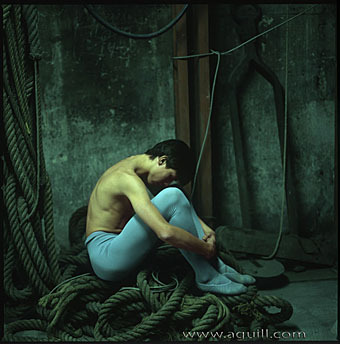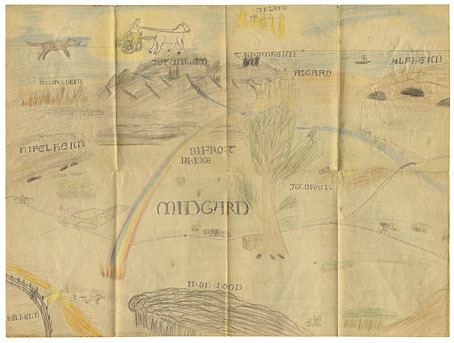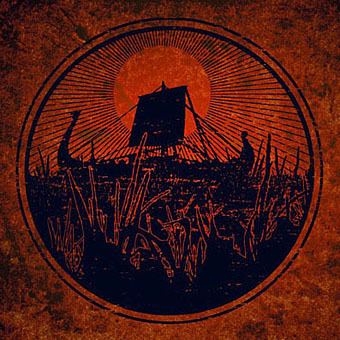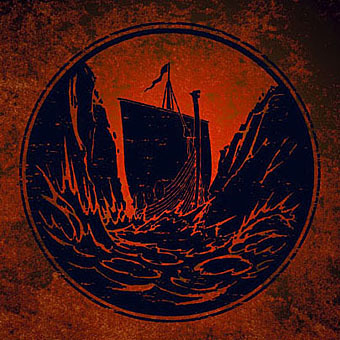John Coulthart's Blog, page 299
September 3, 2011
Weekend links

Johnny YesNo video cover, 1983. Design by Neville Brody.
Being a Cabaret Voltaire enthusiast of long standing it was good to hear last week about the imminent reappearance of Johnny YesNo, an hour-long film by Peter Care for which the Cabs provided the soundtrack. Mute Records will be releasing Care's debut on DVD in a set which includes two versions of the film together with two music CDs. I never got to see the original release on CV's VHS label, Doublevision; for most of the 1980s I didn't even have a colour TV never mind a video recorder so I missed all CV's videocassettes aside from Gasoline In Your Eye. The new edition will be available in November. Brainwashed has a list of the contents while The Quietus posted a clip from the new "redux" version. (And before anyone tells me it's on YouTube…yeah, everything is on YT in shitty quality and barnacled with the misanthropy-inducing drivel which passes there for comment. If I'm going to watch something for the first time I'd prefer it to be on a shiny disc, thanks.)
• The world has noticed Terrence Malick again following the release of The Tree of Life. Malick's second feature is returning briefly to UK cinema screens, an event which prompted David Thomson to ask Is Days of Heaven the most beautiful film ever made?
• This week in imaginative art: S. Elizabeth on The Fantastical Fairy Tale Art of Sveta Dorosheva, AS Byatt on the strange paintings of Richard Dadd (there's another Dadd article here), and Rick Poynor on Chris Foss and the Technological Sublime.
• Ethan Hein demonstrates how Alan Lomax came to have copyright control over many songs he had nothing to do with simply by recording traditional music.
• Visual Vitriol: The Street Art and Subcultures of the Punk and Hardcore Generation, a book by David Ensminger.
• More Club Silencio: Inside David Lynch's Paris nightclub and a gallery of photos.
• Histoire un-Naturelle, selected works by Ruth Marten.
• Come hither: The deceptive beauty of orchids.
• More Peter Care: Just Fascination (1983) by Cabaret Voltaire | Sensoria (1984) by Cabaret Voltaire | Rise (1986) by Public Image Ltd.
September 2, 2011
SteamPunk Magazine
The phone line trouble was resolved quicker than I expected thanks to a couple of efficient engineers and a new line. Normal service is now resumed.
Last month seemed to be one rush job after another, of which this was one of the results, a cover for a forthcoming collection of pieces from SteamPunk Magazine. Another collage work mostly, juxtaposed against one of the photos I took years ago of rusting rail bridge supports in central Manchester. Those photos get used a lot when I need some organic textures: one of the others fills in the background of the cover for Jeff VanderMeer's Finch. I really ought to get some fresh pictures.
I'm not sure when this collection will be out but when it is the news will be mentioned here. And while we're on the subject, it's worth mentioning again that SJ Chambers, co-editor with Jeff V of The Steampunk Bible, will be appearing at The Last Tuesday Society in London this coming Tuesday. Details here.
Previously on { feuilleton }
• Morlocks, airships and curious cabinets
• The Steampunk Bible
• Steampunk Reloaded
• Steampunk overloaded!
• More Steampunk and the Crawling Chaos
• Steampunk Redux
• Steampunk framed
• Steampunk Horror Shortcuts
September 1, 2011
Mongolian impressions
My phone line problem still hasn't been resolved but I am able to get online again for longer than two minutes at a time…for now. Posting may remain sporadic for the next few days.
This is the third time I've written about Impressions de la Haute Mongolie, a 50-minute film made by José Montes-Baquer in the mid-70s in which Salvador Dalí is our guide on a phantasmic journey through micrographic landscapes. Dalí's narration covers such diverse subject matter as Raymond Roussel, giant hallucinogenic mushrooms, Outer Mongolia and Adolf Hitler. The film turned up at Ubuweb a few years ago but without English subtitles. (A document with an English translation was added later.) Now YouTube user DrewBadly has added the English translation to a copy of the film he's posted on his YT channel. It's essential viewing for Dalí enthusiasts.
Related: A Movable Feast, Raymond Roussel's extravagant, hermetic universe.
Previously on { feuilleton }
• Hello Dali!
• Dalí and the City
• Dalí's Elephant
• Dalí in Wonderland
• Alejandro Jodorowsky's Dune
• Dirty Dalí
• Impressions de la Haute Mongolie revisited
• Dalí and Film
• Salvador Dalí's apocalyptic happening
• Dalí Atomicus
• Impressions de la Haute Mongolie
August 30, 2011
Hiatus

With my on-again/off-again phone problem persisting it's getting impossible to post anything substantial here so I may as well take a break for a few days while I try and get the line fixed. I'm hoping this won't take too long but given the failures of the phone company on previous occasions nothing is certain. In the meantime I'll activate the archive feature to turn up posts from the past. See you on the other side.
August 29, 2011
Le roi et le perroquet ou le transfert de l'ame
I've been having trouble doing anything online today due to a recurrent fault with the phone line so here's something florid and serpentine from Figaro illustré for December, 1896. The title is something about a king and a parrot but that's as much as I'm able to tell you.
August 28, 2011
The recurrent pose #43
Not had one of these posts for a while but the theme still seems inexhaustible. The cute dancer above is Mathieu from a set I linked to earlier by Jean-Philippe Guillemain.
Below there's a pose that's closer to Flandrin's original, complete with seascape and a no doubt uncomfortable rocky perch. This one is from a set of photos by Tony Patrioli at Homodesiribus, and was a tip from Mexicology. (Thanks!)
Elsewhere on { feuilleton }
• The recurrent pose archive
August 27, 2011
Weekend links
Johnny Trunk of Trunk Records reissued the soundtrack to The Wicker Man in 1997. Mr Trunk's latest delve into the cultural past is Own Label: Sainsbury's Design Studio, a book from Fuel examining the supermarket chain's packaging design of the 1960s and 1970s. Creative Review shows some examples while I have to note the uncanny similarity between one of the posters for The Wicker Man and an old Sainsbury's corn flakes box. Now we see that the Old Weird Britain wasn't only hiding in the fields and the folk songs but was also lurking on the supermarket shelves.
Related: a new DVD set from the BFI, Here's a Health to the Barley Mow: A Century of Folk Customs and Ancient Rural Games. And let's not forget the ley lines of Milton Keynes, and a new edition of Ritual by David Pinner, said to be the novel which inspired The Wicker Man.
• "He wrote me…" Sans Soleil (1983), Chris Marker's beguiling accumulation of memories, dreams and reflections, is recalled in a Quietus piece entitled Things that Quicken the Heart. Not the first time on DVD as it says there (Nouveaux Pictures released it with La Jetée in 2003) but it's good to know it's being reissued.
• Marker's film references Tarkovsky's Stalker a couple of times, most notably in the comment, "On that day there will be emus in the Zone." Geoff Dyer has what he describes as "a very detailed study" of Stalker out next year.
I don't like those commentators who keep on saying that London will never be the same again. London is always the same again. I remember those comments were made very loudly after the [July 2005] terrorist attacks – "London will never be the same again, London has lost its innocence" – it was all nonsense. London was exactly the same again the following day. Rioting has always been a London tradition. It has been since the early Middle Ages. There's hardly a spate of years that goes by without violent rioting of one kind or another. They happen so frequently that they are almost part of London's texture. The difference is that in the past the violence was more ferocious, and the penalties were more ferocious – in most cases, death.
Peter Ackroyd, reminding us that the Four Horsemen of the Apocalypse don't wear hoodies and ride bikes.
• Wolf Fifth: "rare vinyl records from the golden era of avant garde and experimental music". And in FLAC as well, not crappy mp3; I want to hear all those scratches uncompressed, dammit!
• Another great mix at FACT, this time compiled by snd who throw together Morton Feldman, Siberian shamen, Einstürzende Neubauten, Dome, Oval and many others.
• Colin Marshall asks "how weird is Australia?" in an appraisal of Nicolas Roeg's Walkabout.
• A Comprehensive Solution to the Tokyo Umbrella Problem.
• More poster art from Hapshash and the Coloured Coat.
• Morbid Excess, a series of drawings by May Lim.
• Conrad Schnitzler (1937–2011) by Geeta Dayal.
• Willow's Song (1973) by Paul Giovanni & Magnet | The Willow Song (1989) by The Mock Turtles | Wicker Man Song (1994) by Nature and Organisation.
August 26, 2011
Maps and legends
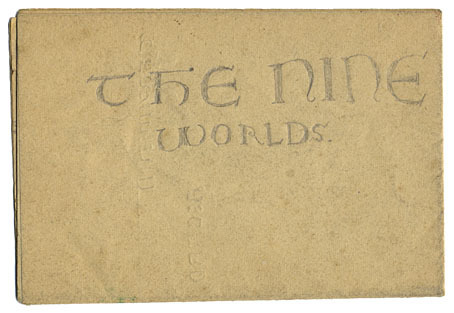
Following the mention yesterday of my facsimile John Speed map I set about searching for the map in question since it's managed to survive all these years. For the moment I haven't been able to find it but going through a portfolio of old drawings I finally found this item, a map or chart or the Nine Worlds of Norse mythology which I drew when I was 11 years old. Various family traumas mean a lot of my early artwork hasn't survived so this drawing is the earliest piece of my work that I own. (Click below for a bigger view.)
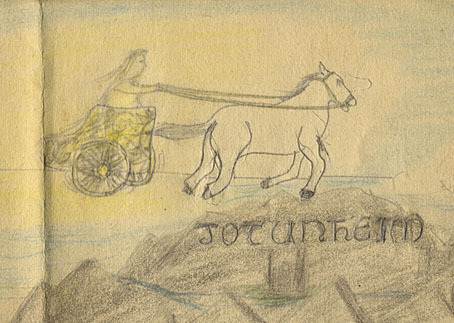
Sol in her Sun Chariot. The horse evidently looked better after a second attempt.
I can be specific about my age since I remember drawing this in 1973 shortly after moving to secondary school. The paper is the horrible stuff that was standard issue at that place, rough and terrible for pencil work. I'd been given a new set of coloured pencils so took advantage with this to use just about every colour in the box.
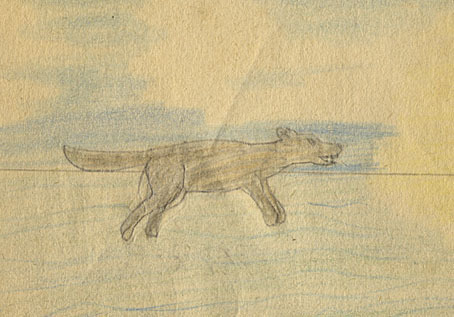
The wolf that chases Sol.
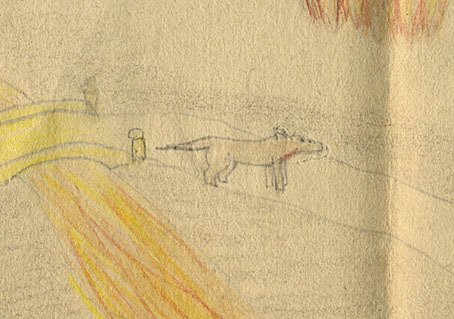
Beware the red-breasted mutt! The gates of Helheim.
For a while after drawing this I felt it was quite successful which is one reason I took the trouble to preserve it; looking at it now I'm amused at how crude it is compared to my fond memories. A few years later I became fanatic about drawing tiny details but there's hardly any detail here at all. The scary wolf that chases the chariot of the sun across the sky, and the bloody-chested creature guarding the gates of Helheim look like oversize doggies.

Odin on Sleipnir.
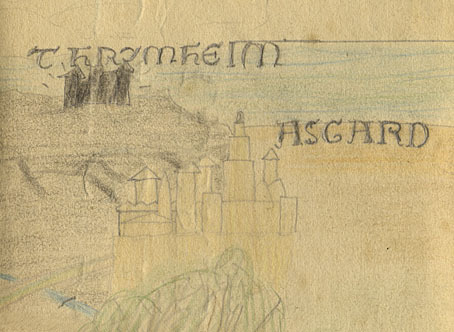
The letter shapes were carefully copied from an alphabet I found somewhere but I can't remember the source. My being so well-versed in Norse mythology was down to my favourite book at the time, The Myths of the Norsemen by Roger Lancelyn Green. I also liked the illustrations in Green's book by Brian Wildsmith whose drawing of Odin's magical steed, Sleipnir (below), is echoed by my own minuscule version at the bottom of the map.
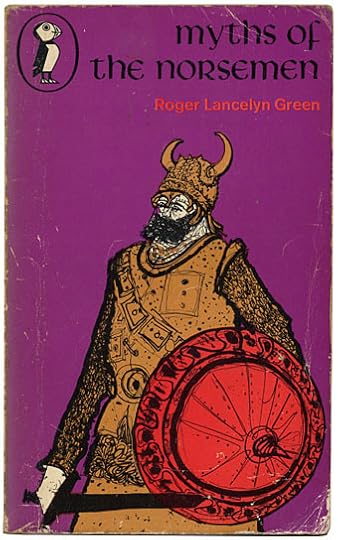
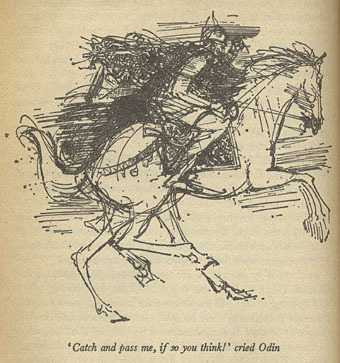
This fondness for the adventures of Odin, Thor, Loki, and company sent me to the Marvel Comics stories about Thor which I read for a while but didn't enjoy half as much. Jack Kirby's Thor presented Asgard as a kind of bad science fiction which lacked the darkness and strangeness of Green's retellings. Beneath the surface of Green's prose you sense the harsh and violent world which gave birth to myths of Gods and Giants, the world which also gave us Beowulf; Marvel's equivalent seemed horribly plastic and artificial, like a Las Vegas imitation of something deep and filled with dread; the dread, of course, being Ragnarok which all the gods know is coming but are powerless to prevent. Green's book relates the Twilight of the Gods in a thrilling and powerful final chapter.
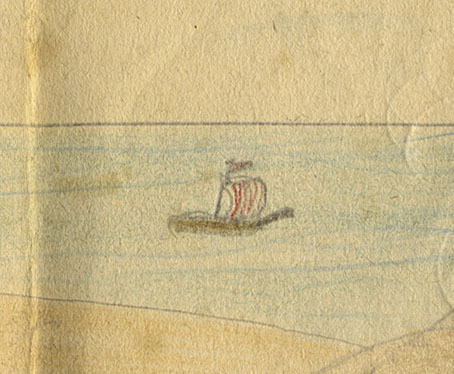
This tiny detail of a Viking longship presages the future in a way I couldn't have anticipated. In 2007 I designed a CD package for Finnish metal band Turisas, an elaborate concept album which relates the journey of a longship along the Varangian trade route from the Gulf of Finland to Byzantium. If my 11-year-old self could have seen into the future I'm sure he would have been thrilled by the idea and by the pictures.
Previously on { feuilleton }
• Cain's son: the incarnations of Grendel
August 25, 2011
Compass roses
Compass rose by John Speed (1610).
Be still, my beating heart… Every so often this graphic designer has been known to complain that there isn't a decent resource for those cartographic details known as compass roses. Well today I hit the motherlode with the discovery of Alte Schiffskompasse und Kompassteile im Besitz Hamburger Staatsanstalten (1910) by Albert Schück at the Internet Archive. Schück's book is a small study of the evolution of the compass card from crude diagram to the elaborate creations seen here, bedizened with astrological figures or divided into degrees. The plates are exactly the kind of thing I've been after for years, not that I need them for any particular purpose but—given that I fetishise these things—it's good to have them to hand.
Part of the obsession can be traced to the compass rose on John Speed's map of Great Britain and Ireland (above). My teenage bedroom walls included among their pictures a facsimile of Speed's map printed on some peculiar plasticised paper which (as I recall) was supposed to make it look an antique print. When drawing maps of my own I'd usually copy Speed's compass rose, and familiarity with the device meant that I started searching them out whenever I saw another old map. Also on the bedroom wall was Pauline Baynes' map of Middle Earth which includes a compass rose of its own.

BibliOdyssey posted a nice selection of Speed maps recently, all of them hand-coloured (my reproduction was black-and-white). Speed's compass rose for the Isle of Man makes the island appear to be the centre of the world. Also at the Internet Archive is a similar study to the Schück, The Rose of the Winds: The origin and development of the Compass-Card (1913) by Silvanus P Thompson. This is more useful if your interest is in the actual history of the cards since the diagrams are a lot less extravagant. Among other things Thompson refers to Schück's volume in a note about the origin of the fleur-de-lys figure as a compass fixture. "Rose of the Winds" refers to the very earliest compass devices in which directions were marked not with North, South, East and West but with whatever the local names were for the winds at sea.









Previously on { feuilleton }
• Pauline Baynes, 1922–2008
• Imaginary maps by Francesca Berrini
August 24, 2011
Thom Ayres

Mr Ayres is a blogger at Form is Void, an occasional commenter on these pages and also a photographer with a keen eye for detail and the occasional outbreak of alarming taxidermy. I especially like the architectural pieces, and I never tire of seeing rusted surfaces and flaking paintwork (one of the best things about growing up in a seaside town). There's a lot more to be seen here, and at Thom's Flickr pages.





John Coulthart's Blog
- John Coulthart's profile
- 31 followers





